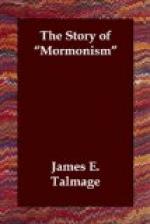And what was the cause of this hurried departure of the military? For many months, ominous rumblings had been heard,—indications of the gathering storm which was soon to break in the awful fury of civil strife. It could not be doubted that war was imminent; already the conflict had begun, and a picked part of the army was away in the western wilds, doing nothing for any phase of the public good. But a word further concerning the expedition in general. The sending of troops to Utah was part of a foul scheme to weaken the government in its impending struggle with the secessionists. The movement has been called not inaptly “Buchanan’s blunder,” but the best and wisest men may make blunders, and whatever may be said of President Buchanan’s short-sightedness in taking this step, even his enemies do not question his integrity in the matter. He was unjustly charged with favoring secession; but the charge was soon disproved.
However, it was known that certain of his cabinet were in league with the seceding states; and prominent among them was John Floyd, secretary of war. The successful efforts of this officer to disarm the North, while accumulating the munitions of war in the South; to scatter the forces by locating them in widely separated and remote stations; and in other ways to dispose of the regular army in the manner best calculated to favor the anticipated rebellion, are matters of history. It is also told how, at the commencement of the rebellion, he allied himself with the confederate forces, accepting the rank of brigadier-general. It was through Floyd’s advice that Buchanan ordered the military expedition to Utah, ostensibly to install certain federal officials and to repress an alleged infantile rebellion which in fact had never come into existence, but in reality to further the interests of the secessionists. When the history of that great struggle with its antecedent and its consequent circumstances is written with a pen that shall indite naught but truth, when prejudice and partisanship are lived down, it may appear that Jefferson Davis rather than James Buchanan was the prime cause of the great mistake.
And General Johnston who commanded the army in the west; he who was so vehement in his denunciation of the rebel “Mormons,” and who rejoiced in being selected to chastise them into submission; who, because of his vindictiveness incurred the ill-favor of the governor, whose posse comitatus the army was; what became of him, at one time so popular that he was spoken of as a likely successor to Winfield Scott in the office of general-in-chief of the United States army? He left Utah in the early stages of the rebellion, turned his arms against the flag he had sworn to defend, doffed the blue, donned the grey, and fell a rebel on the field of Shiloh.




